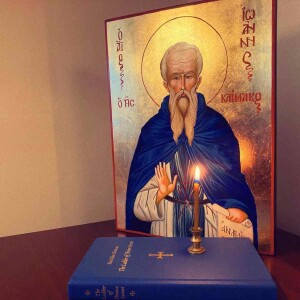Darkness, whatever its source, cannot be driven out or overcome by mere force of will or through reason. The fathers reveal to us a darkness that exists within the human heart like no other - insensibility. It is a deadening of the soul and the death of the mind before the death of the body. We all have our vulnerabilities and have experienced wounds on both spiritual and emotional levels. To address this darkness requires an even greater trust in the grace of God to guide us through it and to provide us with what is necessary for healing. Each person is unique and with certain predispositions, including the predisposition to a more melancholic or morose state of mind. Furthermore, the human mind and heart are ever so changeable.
It is also how the evil one can use these things to distort our vision of reality. We can be engaged in the religious and spiritual life and speaking about it and yet this can mask not only a sham piety but something even darker. We can live in the dark so long that it becomes the place of comfort. To move toward the light can be painful, especially if one has experienced trauma.
More than any of the passions the remedy for this darkness consists of relying upon the grace of God and being drawn into the tenderness of Christ’s love. When our trust has been destroyed, we must allow Him to rebuild it. Where desire has been lost, we must wait for the Beloved to come to us to stir it into flame. Where wounds are so deep that they seem irreparable, it is only He who is the Lord of Life who can re-create us.
---
Text of chat during the group:
00:13:51 Susan M: Thank you for introducing me to the Optina Monastery and Elders! Am buying the recommended book.
00:26:47 John: Are all these internal contradictions the same as hypocrisy, or is that a different malady?
00:39:22 sharonfisher: That’s so interesting. I find myself unwilling to be around these really negative people. I love them, but I have my own issues battling depression. It’s hard to do both at once.
00:50:23 Ren Witter: I wonder - would these people really appear very negative on the exterior? So much of the description involves teaching or speaking, and most often those who take up that role are very dynamic and charismatic personalities. It seems like the melancholy aspect might kind of hidden.
01:01:36 Kate: Fr. David, Is this also known as sloth? Or is that a different vice?
01:01:41 Ren Witter: I’ve been told that this, or something very similar to it, can be caused by a traumatic event - particularly one involving the Church in some way. Are fasting and vigils still the only way to begin fighting it in that case?
01:06:20 Ren Witter: “He and I” is also a very good one.
01:06:43 carol nypaver: Can you please repeat the name of the French priest and his book?
01:07:21 Louise: Gaston Courtois is the name of the French priest.
01:07:31 carol nypaver: Thank you!
01:09:32 David Swiderski: My experience is this often is connected to resentment and lack of detachment. Anyone digging up wounds from the past or worrying about the future cannot help themselves from falling into despair.
01:13:25 Louise: In my clinical experience, it was my willingness as a psychotherapist to be there with the, to remain with them despite the intensity of their pain, which was healing - I did not abandon them as they were experiencing abandonment depression from early childhood.
01:17:10 Cindy Moran: Thank you Father!
01:17:10 Lorraine Green: Thank you Father
01:17:15 David Swiderski: Thanks father!
01:17:17 Rebecca Thérèse: Thank you🙂

No comments yet. Be the first to say something!